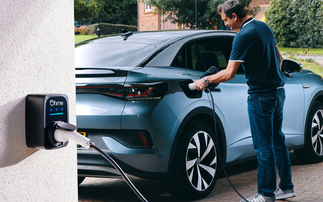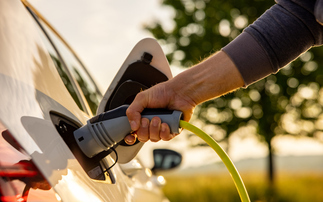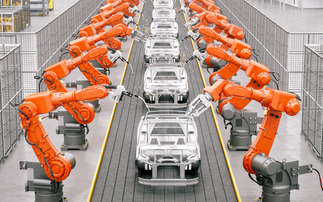New report details how co-ordinated and long term low carbon policies have been central to the recovery of the UK's automotive industry
The resurgence of the UK's automotive industry has been one of the most remarkable and significant business success stories of the past decade, and according to a new report published today, we have low carbon policy to thank for it.
Over the past 10 to 15 years the UK's auto sector has been transformed, from a state of barely managed decline to one of the economy's undisputed powerhouses. The automotive manufacturing sector has seen revenues climb from £46.3bn in 2003 to £64.1bn in 2013, while car production has soared from one million units a year in 2009 to 1.5 million units last year. Moreover, exports now account for over three-quarters of UK car production, delivering a huge boost to the balance of trade, while productivity per worker has jumped 45 per cent over the past 10 years. And all of this has been achieved despite both the worst economic crisis in a generation and warnings that environmental regulations would cripple the industry.
So, what went so right? How did the industry manage to combine sales growth, productivity gains, and a drastic improvement in its carbon emissions that has seen average tailpipe emissions fall 25 per cent inside a decade? Those were the questions the Low Carbon Vehicle Partnership (LowCVP) set out to answer when it commissioned consultancy E4tech and the Centre for Automotive Industry Research at Cardiff Business School to assess the relationship between low carbon policies and auto industry investment. The resulting report, which will be presented today at LowCVP's annual conference in London, concludes that consistent and ambitious environmental policies have played a major role in revitalising the industry.
The report, which is based on a survey of over 100 senior auto industry executives and interviews with a number of key stakeholders, reveals that over the past decade there has been £17.6bn of investment in 291 identified low and ultra-low carbon R&D projects and manufacturing capacity. "By extrapolation, the true value of investments is possibly of the order of £40bn because the database only contains definite values for around 40 per cent of the identified investments, and does not include wider multiplier impacts in the supply chain," the report adds. "Cumulative investments have risen strongly towards the latter part of this study, suggesting that funding and policy structures have gained increasing traction over time."
The net result is a track record of considerable success when it comes to clean tech development and deployment. Not only have average carbon emissions fallen 25 per cent over the past 10 years ensuring the EU's 2015 target of 130g/km was met two years ahead of schedule, but average fuel economy has risen from 42.2mpg in 2003 to 56.3mpg in 2013, between 2002 and 2012 private consumption of vehicle fuel fell 18 per cent in volume terms per head.
According to the report, there is a large degree of agreement across the industry on the driving forces behind this progress, with executives repeatedly highlighting the contribution made by stable long term policies and a co-ordinated approach to investment and technology development from government and industry.
"The emphasis of policy makers on environmental achievements and ‘green growth' has bolstered the foundations of the UK automotive sector," said Andy Eastlake, managing director at LowCVP. "Experience over the last 10 years shows that a consistent policy approach based on collaboration between all stakeholders can deliver dividends. This represents the first strides on the road to meeting the environmental imperative of decarbonising road transport by 2050."
Specifically, executives highlighted the importance of both the EU's fuel efficiency and emission reduction standards for new cars and the over-arching UK Climate Change Act, which the report credited with "setting the direction of travel". The EU standards and their emission reduction targets for 2015 and 2020 may have faced initial opposition from some auto manufacturers, but unlike with policies for green energy and buildings the regulations have been stuck with and as a result manufacturers have been forced to adapt. This consistency has also helped to deliver a shift in mindsets for many within the auto industry. As one executive at an automotive R&D services company observes in the report: "Back then, environmental regulation was seen as a threat not an opportunity." But attitudes now appear to have changed, with another automotive manufacturer admitting that "the creation of a level playing field [CO2 target] by the European Commission was extremely helpful".
"A clear long term target is what industry needs - it will find a way to respond," they added.
Respondents to the survey also detailed how specific policies and funding programmes designed to support the over-arching targets have proved highly successful, in large part because they have helped deliver a coherent industrial strategy. For example, the creation of the Automotive Council, the Technology Strategy Board, the Advanced Propulsion Centre, the Office for Low Emission Vehicles, and the LowCVP were all credited with helping to drive investment in the sector, while grants for new electric and ultra-low emission vehicles and the creation of a recharging network has helped to create a market for new green car technologies. The report suggests this approach is proving successful, with 72 per cent of respondents to the survey claiming that grant programmes had influenced their R&D investments.
"Government policy context and strategic goals and targets will have a role to play in the investment decision making environment," said one exec at a leading manufacturer. "It may not be the determining factor - but it will be evaluated positively or negatively."
Report co-author Adam Chase of E4tech said the government had delivered a rare achievement in the form of a stable yet ambitious green policy environment that had secured widespread business support. "It's unusual to receive such a consistently positive message when reviewing the effects of government policy," he said. "Time and again we heard that a long term vision, collaboration and supportive policies are giving companies the confidence to invest in low carbon developments. Where these are missing the opposite is true."
However, while praising the government's low carbon vehicle framework the report also acknowledges that the journey towards full decarbonisation of road transport has only just begun and puts forward a number of recommendations where further progress is needed. Specifically, it argues that a more ambitious approach to air quality is required along with a renewed focus on cutting emissions from commercial vehicles. It also highlights the well documented calls for the EU and the UK government to clarify the future direction of biofuels policy in the bloc.
More broadly, the report notes that the industry is now undergoing a transition from low carbon vehicle R&D to low carbon vehicle manufacturing and as such policies may have to evolve accordingly. "Much of the low carbon innovation that has occurred in recent years in the UK is approaching technological maturity, but is still some way from manufacturing maturity," the report states. "For the UK to gain maximum value this journey needs to be pursued to the end with appropriate support, thus ensuring that benefits accrue to the UK rather than being driven offshore."
Similarly, the report highlights concerns amongst a number of executives that the industry's continued expansion means it is facing the risk of a skills shortage. "Several commentators noted that skills are becoming a challenge for the further development of the UK automotive sector," the report said. "This relates not just to highly skilled university-level graduates, but also to the future technicians for whom apprenticeships and other training are needed."
Eastlake said that the onus was now on both the government and the industry to build on its recent successes. "There are no grounds for complacency and the job is far from done," he said. "We urgently need to repeat the success seen in our passenger car and bus sectors, in all aspects of road transport such as the truck and commercial vehicle industries and of course the supply of low carbon fuels and energy to power all forms of transport."
The report will inevitably spark questions from environmentalists as to whether progress on green cars needs to be complemented by similarly bold steps that also help reduce demand for automotive transport altogether through improved public transport, better urban planning, and shared consumption models. But it makes it abundantly clear that stable, coherent and ambitious environmental regulations and policies can deliver a clean tech revolution, just as long as politicians and businesses are willing to work together towards a shared goal.
BusinessGreen is a media partner of LowCVP Conference 2014










